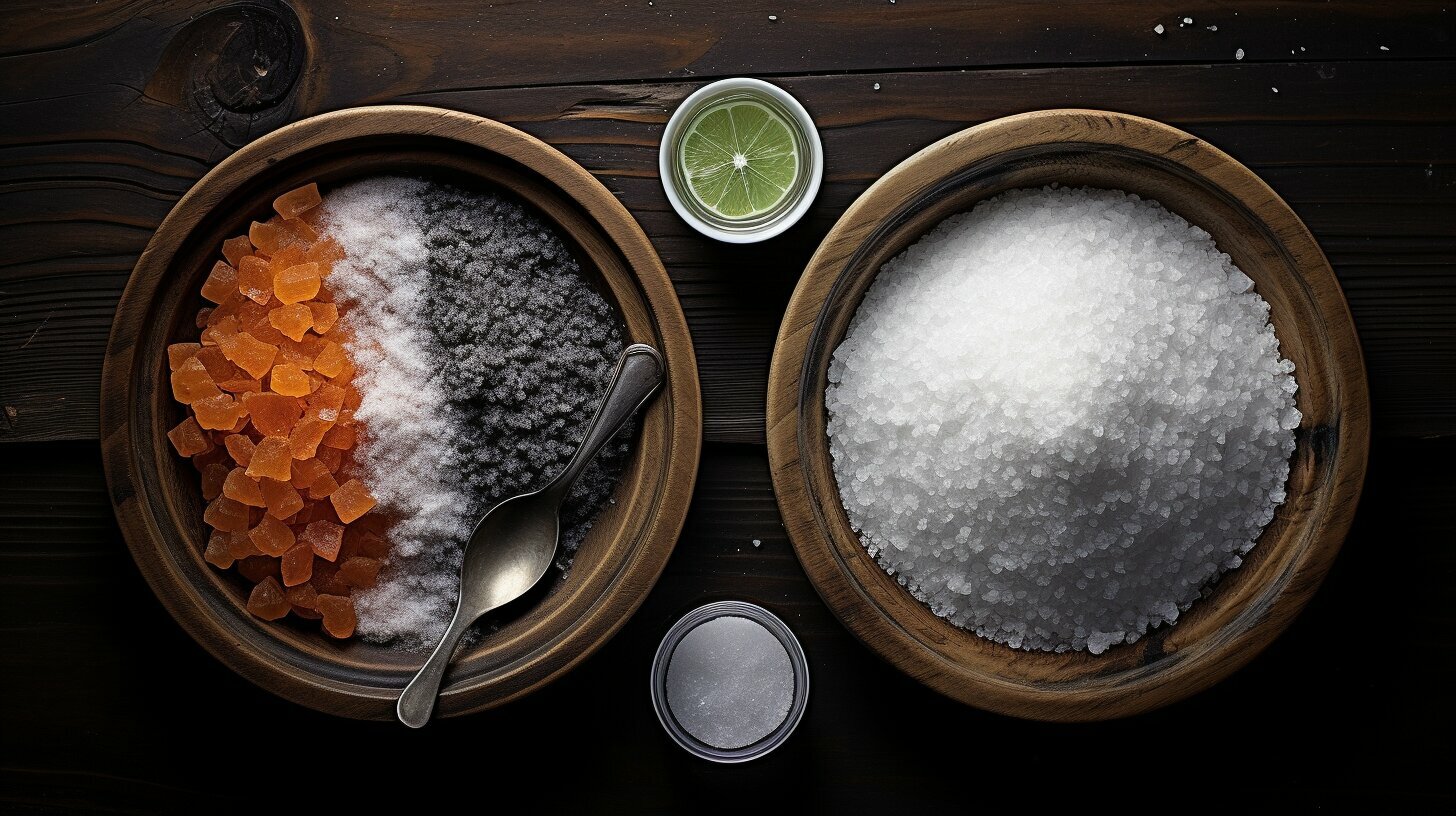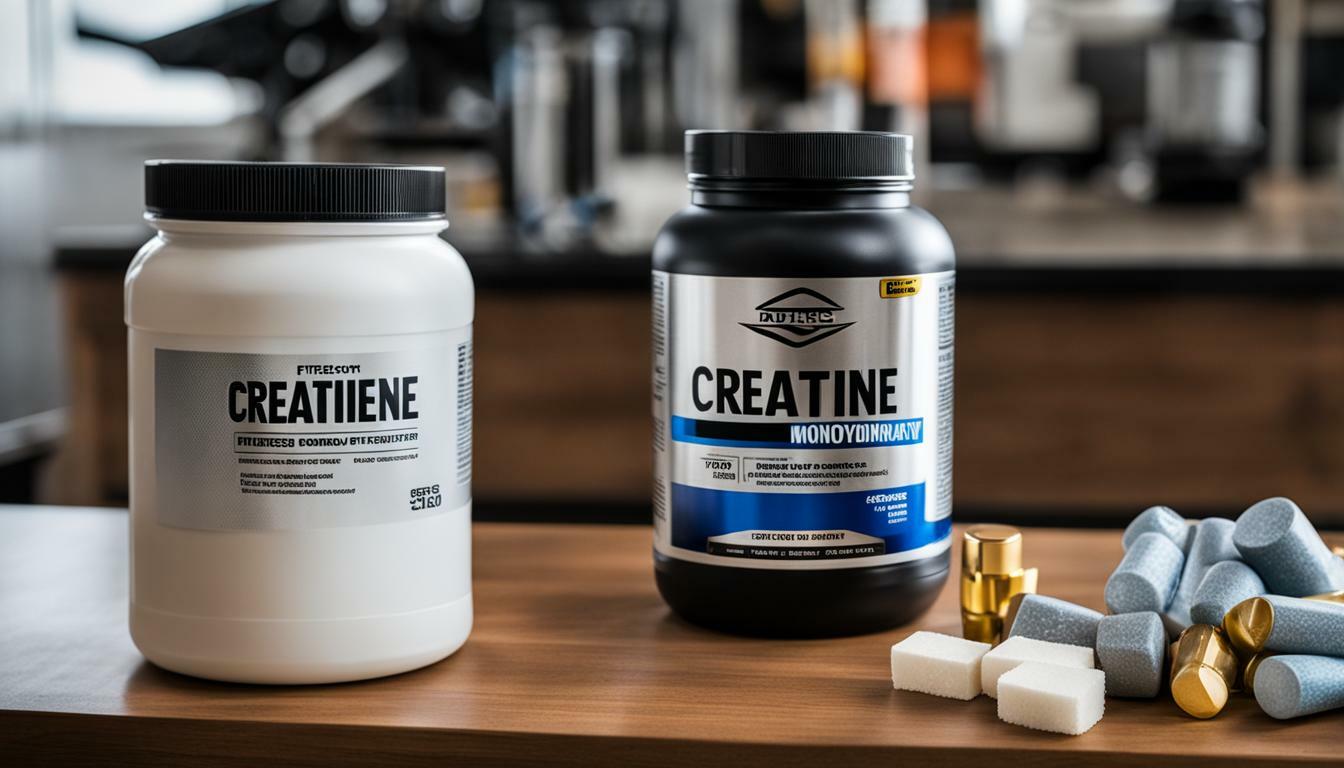Are you curious about the difference between iodized and non-iodized salt and how it can impact your health? Salt is a common ingredient in almost every kitchen, but not all salt is created equal. The main difference lies in the presence or absence of iodine, a crucial nutrient that plays a vital role in various bodily functions. In this article, we will explore the disparities between iodized and non-iodized salt, their benefits, and the importance of iodine in maintaining optimal health.
Key Takeaways
- Iodized salt is salt fortified with iodine to prevent iodine deficiency and promote optimal health.
- Non-iodized salt does not contain added iodine and lacks the same nutritional benefits as iodized salt.
- Iodine is essential for thyroid function, metabolism, and the healthy development of unborn babies and young children.
- Iodized salt is recommended for specific groups, such as pregnant or breastfeeding individuals, those following a vegan diet, and people residing in iodine-poor areas.
- Both types of salt have similar sodium content and can be used interchangeably in most cases, but the choice ultimately depends on personal preference.
What is Iodized Salt?
Iodized salt is table salt that has been fortified with a trace amount of iodine to prevent iodine deficiency. It plays a crucial role in maintaining thyroid function, supporting metabolism, and ensuring the healthy development of unborn babies and young children. The addition of iodine to salt has proven to be a cost-effective and efficient way to address iodine deficiency, a global public health problem.
“Iodine deficiency is the leading cause of preventable intellectual and developmental disabilities worldwide.”
Iodine is an essential mineral that the body cannot produce on its own, so it must be obtained through the diet. However, iodine deficiency is still prevalent in many parts of the world, particularly in regions where the soil is iodine-poor. This deficiency can lead to serious health issues, including goiter, hypothyroidism, impaired cognitive function, and developmental disorders.
| Health Benefits of Iodized Salt |
|---|
| Ensures proper thyroid function |
| Supports metabolism and energy production |
| Promotes healthy growth and development in children |
| Prevents goiter and other iodine deficiency disorders |
| Supports brain development and cognitive function |
While both iodized and non-iodized salt have similar sodium content and can be used interchangeably in most cases, iodized salt is recommended for certain groups of people. This includes pregnant or breastfeeding women, as they have increased iodine requirements to support the growth and development of their babies. Additionally, individuals following a vegan diet, which may lack iodine-rich foods such as seafood, can benefit from using iodized salt. It is crucial to read product labels carefully to ensure that the salt you choose is indeed iodized.
Ultimately, the choice between iodized and non-iodized salt comes down to personal preference in terms of taste and texture. However, it is important to note that consuming salt in moderation is key to maintaining a healthy lifestyle. Following dietary guidelines for sodium intake can help prevent high blood pressure, heart disease, and other health problems associated with excessive salt consumption.
The Role of Iodine in the Body
Iodine plays a crucial role in thyroid function, metabolism, and the healthy development of unborn babies and young children. The thyroid gland, located in the neck, uses iodine to produce hormones that regulate the body’s metabolism, growth, and development. These hormones are essential for maintaining overall health and supporting various bodily functions.
Iodine deficiency, which occurs when the body does not get enough iodine, can have serious consequences. It can lead to thyroid disorders, such as goiter, hypothyroidism, and impaired cognitive development in children. In fact, iodine deficiency is considered the most preventable cause of intellectual impairment worldwide.
To ensure adequate iodine intake and prevent deficiency, iodized salt is recommended. Iodized salt is table salt that has been fortified with iodine. It provides a simple and effective way to address iodine deficiency, as it is widely consumed and easily accessible. Just a small amount of iodized salt can help meet daily iodine requirements and support optimal thyroid function.
While non-iodized salt does not provide the same nutritional benefits as iodized salt, both types of salt have similar sodium content and can be used interchangeably in most cases. However, certain groups of people, such as pregnant or breastfeeding women, individuals following a vegan diet, and those living in areas with iodine-poor soil, are advised to choose iodized salt to ensure sufficient iodine intake.
| Benefits of Iodized Salt | Risks of Iodine Deficiency |
|---|---|
|
|
“Iodine deficiency is considered the most preventable cause of intellectual impairment worldwide.”
Ultimately, the choice between iodized and non-iodized salt comes down to personal preference in terms of taste and texture. However, it is important to note that consuming salt in moderation is key to maintaining a healthy lifestyle. Following dietary guidelines for sodium intake can help prevent high blood pressure, heart disease, and other related health issues.
Non-Iodized Salt: What You Need to Know
Non-iodized salt, also known as plain salt, does not contain added iodine and therefore lacks the nutritional benefits provided by iodized salt. While both types of salt have similar sodium content and can be used interchangeably in most cases, it is important to understand the differences between them.
One key difference is the role that iodine plays in our bodies. Iodine is essential for thyroid function, metabolism, and the healthy development of unborn babies and young children. By using iodized salt, individuals can help prevent iodine deficiency, a condition that can lead to thyroid disorders and impaired brain development.
However, there are certain groups of people who may opt for non-iodized salt. For example, those who follow a vegan diet may prefer non-iodized salt as it aligns with their dietary choices. Additionally, individuals who live in areas with iodine-rich soil may not require the additional iodine provided by iodized salt.
| Non-Iodized Salt | Iodized Salt |
|---|---|
| Does not contain added iodine | Fortified with iodine |
| Lacks the nutritional benefits of iodine | Provides essential iodine for the body |
| Suitable for those who follow a vegan diet | Recommended for specific groups, including pregnant or breastfeeding individuals |
Ultimately, the choice between iodized and non-iodized salt comes down to personal preference in terms of taste and texture. It is important to consume salt in moderation, regardless of the type chosen, and to follow dietary guidelines for sodium intake to maintain a healthy lifestyle.
Choosing Between Iodized and Non-Iodized Salt
The choice between iodized and non-iodized salt depends on various factors, such as individual dietary needs, health conditions, and personal preferences. Both types of salt have similar sodium content and can be used interchangeably in most cases, but there are some key considerations to keep in mind.
If you are pregnant or breastfeeding, it is recommended to use iodized salt. Iodine is crucial for the healthy development of unborn babies and young children, and iodized salt provides a convenient way to ensure an adequate intake of this essential mineral.
For individuals following a vegan diet or living in areas with iodine-poor soil, iodized salt is also a preferred choice. Plant-based diets may not naturally provide enough iodine, and iodine-poor soil can lead to a deficiency. Using iodized salt helps to meet the recommended iodine intake and prevent any related health issues.
| Iodized Salt | Non-Iodized Salt |
|---|---|
| Fortified with iodine | Does not contain added iodine |
| Recommended for pregnant, breastfeeding women, vegans, and those in iodine-poor areas | May be preferred by individuals who want to control their iodine intake or have specific dietary restrictions |
| Helps prevent iodine deficiency and related health issues | Does not provide the same nutritional benefits as iodized salt |
Ultimately, the choice between iodized and non-iodized salt comes down to personal preference in terms of taste and texture. Some individuals may prefer the pure and natural flavor of non-iodized salt, while others may find that iodized salt better suits their needs for a well-rounded diet. Whichever option you choose, it is important to ensure you consume salt in moderation and follow dietary guidelines for sodium intake to maintain a healthy lifestyle.
Recommended Salt Choice for Specific Groups
Certain groups of people, such as those who are pregnant or breastfeeding, follow a vegan diet, or live in areas with iodine-poor soil, are advised to use iodized salt to meet their iodine requirements. Iodine is essential for the proper functioning of the thyroid gland, which regulates metabolism and plays a crucial role in the healthy development of unborn babies and young children.
Pregnant and breastfeeding women have increased iodine needs to support the growth and development of their babies. Adequate iodine intake during pregnancy and lactation is vital for the baby’s brain development and overall health. Studies have shown that iodine deficiency during these periods can lead to cognitive impairments and developmental delays.
Vegans, who avoid consuming animal products, are at a higher risk of iodine deficiency as iodine is primarily found in seafood and dairy products. By using iodized salt in their meals, vegans can ensure they meet their iodine requirements and maintain optimal thyroid function.
People living in areas with iodine-poor soil may struggle to obtain sufficient iodine from their diet alone. In such cases, using iodized salt can be an effective way to prevent iodine deficiency and its associated health problems. Regular consumption of iodized salt can help ensure a consistent intake of iodine, even in regions where it is naturally scarce.
To summarize, iodized salt is recommended for specific groups of people, including pregnant and breastfeeding women, individuals following a vegan diet, and those residing in iodine-poor areas. By choosing iodized salt, they can meet their iodine requirements and maintain proper thyroid function. However, it is important to remember that salt should be consumed in moderation and in accordance with dietary guidelines for sodium intake.
| Group | Iodized Salt Recommendation |
|---|---|
| Pregnant and breastfeeding women | Use iodized salt to support the baby’s development |
| Vegans | Use iodized salt to meet iodine needs |
| People in iodine-poor areas | Use iodized salt to prevent iodine deficiency |
Salt in Moderation and Dietary Guidelines
It is important to consume salt in moderation and adhere to dietary guidelines for sodium intake to promote overall health and well-being. Salt, or sodium chloride, is a common ingredient in many foods and plays a crucial role in enhancing flavors and preserving food. However, excessive salt consumption can lead to health issues, including high blood pressure and an increased risk of heart disease and stroke.
According to dietary guidelines, the recommended daily intake of sodium for adults is no more than 2,300 milligrams (mg), which is equivalent to about one teaspoon of salt. Individuals with certain health conditions, such as hypertension or kidney disease, may need to consume even less sodium. It is important to note that most of the sodium we consume comes from processed foods and restaurant meals, rather than the salt we add during cooking or at the table.
To reduce sodium intake, it is advisable to choose fresh, unprocessed foods and cook meals at home using minimal or no added salt. When using salt, opting for iodized salt ensures that you meet your daily iodine requirements. However, for those who prefer the taste or texture of non-iodized salt, it is essential to incorporate iodine-rich foods into their diet, such as seafood, dairy products, and eggs.
| Dietary Guidelines for Sodium Intake | |
|---|---|
| Adults | No more than 2,300 mg per day |
| Individuals with hypertension or kidney disease | No more than 1,500 mg per day |
Remember, the key is moderation. By being mindful of your salt intake and following dietary guidelines, you can maintain a healthy balance and enjoy the benefits of consuming salt without compromising your well-being.
Conclusion
Understanding the difference between iodized and non-iodized salt can help you make an informed decision about which type of salt suits your dietary needs and preferences best.
Iodized salt, fortified with iodine, is crucial for maintaining thyroid function, metabolism, and promoting the healthy development of unborn babies and young children. It provides essential nutritional benefits that non-iodized salt lacks. While both types of salt have similar sodium content and can be used interchangeably, iodized salt is specifically recommended for certain groups of people.
In particular, individuals who are pregnant or breastfeeding, follow a vegan diet, or reside in areas with iodine-poor soil should opt for iodized salt. By doing so, they can ensure sufficient iodine intake and prevent iodine deficiency-related health problems. However, the choice between iodized and non-iodized salt ultimately comes down to personal taste and texture preferences.
It is important to note that regardless of the type of salt chosen, moderation is key. Consuming salt in excessive amounts can have detrimental effects on health. Following dietary guidelines for sodium intake is essential for maintaining a healthy lifestyle. By making conscious choices about the salt we use, we can take control of our nutritional well-being.
FAQ
Q: What is the difference between iodized and non-iodized salt?
A: Iodized salt is table salt that has been fortified with iodine, while non-iodized salt does not contain added iodine.
Q: What is iodized salt?
A: Iodized salt is table salt that has been fortified with iodine to prevent iodine deficiency and related health problems.
Q: What is the role of iodine in the body?
A: Iodine is important for thyroid function, metabolism, and the healthy development of unborn babies and young children.
Q: What do I need to know about non-iodized salt?
A: Non-iodized salt does not contain added iodine and therefore does not provide the same nutritional benefits as iodized salt.
Q: How do I choose between iodized and non-iodized salt?
A: The choice between iodized and non-iodized salt ultimately comes down to personal preference in terms of taste and texture.
Q: Who should use iodized salt?
A: Iodized salt is recommended for certain groups of people, such as those who are pregnant or breastfeeding, follow a vegan diet, or live in areas with iodine-poor soil.
Q: How should salt be consumed?
A: It is important to consume salt in moderation and follow dietary guidelines for sodium intake.
 Skip to main content
Skip to main content


